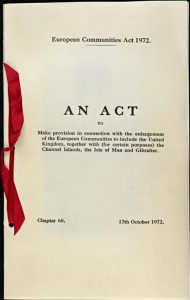On Thursday 22 February 2018 the Joint Ministerial Committee (EU Negotiations) (JMC (EN)) met. Proposed changes to Clause 11 of the EU Withdrawal Bill, to ensure all devolved EU powers transfer directly from Brussels to Belfast, Cardiff and Edinburgh, were shared by the Cabinet Office with the devolved administrations ahead of the JMC (EN).
The EU Withdrawal Bill (“the Withdrawal Bill”), currently before the House of Lords, repeals the European Communities Act 1972 and converts EU law into UK domestic law. Clause 11 of the Withdrawal Bill freezes the competence of the Assembly for Wales in relation to EU law. The Assembly must currently comply with EU law and the Withdrawal Bill says that, after exit, the Assembly will have to comply with retained EU law. The Welsh and Scottish Governments are opposed to Clause 11 and want it amended.
The Chancellor of the Duchy of Lancaster, David Lidington MP, who chairs the JMC (EN) meeting, said the new proposals represented a considerable “offer” from the UK Government that he hoped the devolved governments would engage with constructively. He said:
The changes would mean that the vast majority of powers will automatically flow from the EU to the devolved administrations. As the UK government has made clear, we always expected that the process would result in a significant increase in their decision making abilities. The changes would also ensure the UK Government would have the ability to protect the internal UK market where necessary, in a small number of areas.
A summary and Communique were issued after the meeting. It stated:
The Committee discussed the EU (Withdrawal) Bill, including the proposal to amend clause 11. It was noted that progress had been made, but agreement had not yet been reached between the UK Government, Scottish Government and Welsh Government on the form of an amendment. Discussions on further detail would continue in the coming weeks.
The JMC (EN) also discussed progress on common frameworks. The Communique issued after the meeting stated that multilateral official level discussions had explored a range of areas where common frameworks may be required, including where legislative and non-legislative approaches could be appropriate. These discussions were ongoing.
The Cabinet Secretary for Finance, Mark Drakeford AM, who attended on behalf of the Welsh Government, said :
There is progress - there are ideas we were able to discuss today. They didn't go far enough. They don't meet all the things that we think are necessary to persuade the National Assembly for Wales to support the bill. But we'll meet again and hope that we'll be able to conclude agreement in advance of amendments being put down in the House of Lords.
Scottish First Minister’s Questions took place very soon after the JMC (EN) finished. The First Minister, Nicola Sturgeon MSP, outlined her Government’s continued objections:
Perhaps I can simplify things by saying that what is proposed would not just give the UK Government oversight of this Parliament and Government but, in matters that are devolved to this Parliament, effectively give it powers of imposition or veto. I do not think that that is acceptable, and the Government of Wales does not believe it to be acceptable. That is why there must be further movement from the UK Government if we are going to reach the agreement that I hope we can reach. I think that we are being asked by the UK Government to take it on trust that it will not exercise those powers in an unacceptable way. I am not casting aspersions on the good faith of any individual, but we should not forget that this is a UK Government that, at times, seems willing to ride roughshod over the Northern Irish Good Friday agreement. I do not think that we can simply take it on trust that the same Government would always respect the devolution settlement.
What happens next?
The Welsh Government has previously said in the if the European Union (Withdrawal) Bill (“Withdrawal Bill”) leaves the House of Commons without being amended, it would be unable to recommend that the Assembly grants its legislative consent and would consider introducing a Continuity Bill.
The Continuity Bill would transpose EU law that falls within the Assembly’s competence into Welsh law. It would safeguard the Welsh Government’s power over the areas where EU law and devolved competence intersect and seek to retain EU legislation in devolved policy areas. The Welsh Government has stated however that it is not its preference to pursue a Continuity Bill. A Welsh Government spokeswoman told the Guardian newspaper on the 21 February that:
While we are hopeful an agreement can be reached, we continue to prepare for the introduction of our own legislation as a fail-safe to provide certainty and protect devolution.
Article by Alys Thomas, National Assembly for Wales Research Service
Parliamentary copyright images are reproduced with the permission of Parliament







